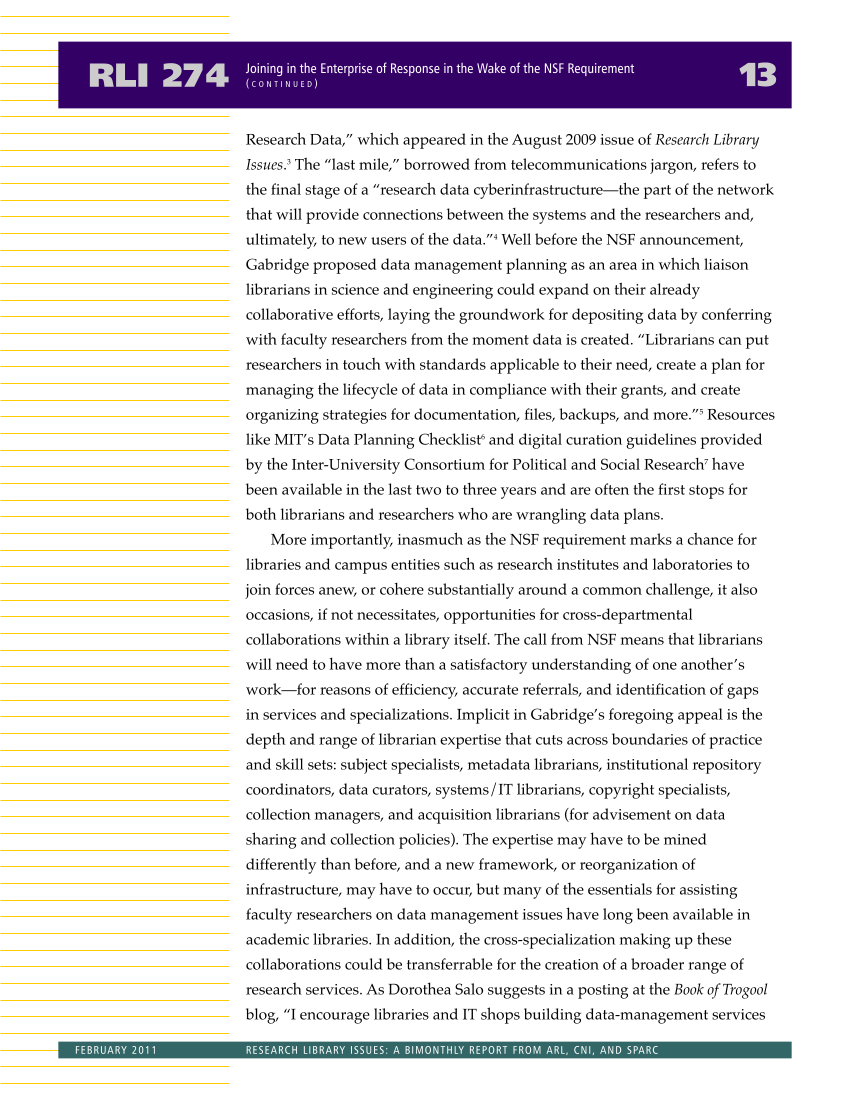Research Data,” which appeared in the August 2009 issue of Research Library Issues.3 The “last mile,” borrowed from telecommunications jargon, refers to the final stage of a “research data cyberinfrastructure—the part of the network that will provide connections between the systems and the researchers and, ultimately, to new users of the data.”4 Well before the NSF announcement, Gabridge proposed data management planning as an area in which liaison librarians in science and engineering could expand on their already collaborative efforts, laying the groundwork for depositing data by conferring with faculty researchers from the moment data is created. “Librarians can put researchers in touch with standards applicable to their need, create a plan for managing the lifecycle of data in compliance with their grants, and create organizing strategies for documentation, files, backups, and more.”5 Resources like MIT’s Data Planning Checklist6 and digital curation guidelines provided by the Inter-University Consortium for Political and Social Research7 have been available in the last two to three years and are often the first stops for both librarians and researchers who are wrangling data plans. More importantly, inasmuch as the NSF requirement marks a chance for libraries and campus entities such as research institutes and laboratories to join forces anew, or cohere substantially around a common challenge, it also occasions, if not necessitates, opportunities for cross-departmental collaborations within a library itself. The call from NSF means that librarians will need to have more than a satisfactory understanding of one another’s work—for reasons of efficiency, accurate referrals, and identification of gaps in services and specializations. Implicit in Gabridge’s foregoing appeal is the depth and range of librarian expertise that cuts across boundaries of practice and skill sets: subject specialists, metadata librarians, institutional repository coordinators, data curators, systems/IT librarians, copyright specialists, collection managers, and acquisition librarians (for advisement on data sharing and collection policies). The expertise may have to be mined differently than before, and a new framework, or reorganization of infrastructure, may have to occur, but many of the essentials for assisting faculty researchers on data management issues have long been available in academic libraries. In addition, the cross-specialization making up these collaborations could be transferrable for the creation of a broader range of research services. As Dorothea Salo suggests in a posting at the Book of Trogool blog, “I encourage libraries and IT shops building data-management services RLI 274 13 Joining in the Enterprise of Response in the Wake of the NSF Requirement ( C O N T I N U E D ) FEBRUARY 2011 RESEARCH LIBRARY ISSUES: A BIMONTHLY REPORT FROM ARL, CNI, AND SPARC






















